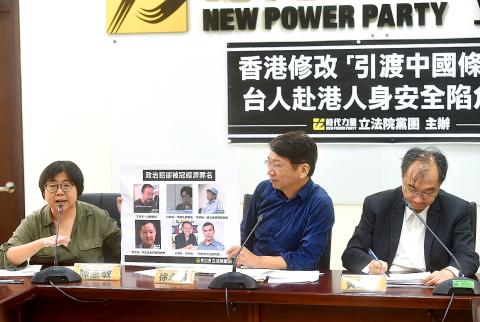Hong Kong Legislative Council members are considering amending the territory’s extradition laws to define Taiwan as part of China, the New Power Party (NPP) said yesterday.
If such amendments were passed, China would treat Taiwan as part of its jurisdiction and “more than 2 million Taiwanese who work and study in Hong Kong could face the same fate as Lee Ming-che (李明哲),” NPP Legislator Hsu Yung-ming (徐永明) said.
Lee, a Taiwanese democracy advocate, was arrested in March 2017 when entering China from Macau, and eight months later was sentenced to five years in prison for “subversion of state power.”

Photo: Chien Jung-fong, Taipei Times
The changes would not only raise the travel risk to Hong Kong, but also lead to greater self-censorship, he said.
The Hong Kong Security Bureau on Friday last week advised the council to amend the Fugitive Offenders Ordinance and the Mutual Assistance in Criminal Matters Ordinance, saying that it is necessary to include “other parts of the People’s Republic of China” to the areas in which the two laws can be applied to allow criminals to be delivered from Hong Kong to Taiwan, Hsu said.
While the proposal has received the support of many pro-China members of the council, when asked about the matter, Minister of Justice Tsai Ching-hsiang (蔡清祥) only said that it has not yet happened and promised to look into it, Hsu said.
Although the proposal is still being discussed, as it concerns the nation’s sovereignty, the Taiwanese government should express its stance on the issue and support a proposal from pro-democracy councilors to only deal with bilateral agreements on extradition between Taiwan and Hong Kong, he said.
The Ministry of Justice would ensure that cross-strait judicial cooperation is handled in an “equal, reciprocal and respectful manner,” and would reject any request that fails to meet those requirements, ministry official Liu Yi-chun (劉怡君) said.
In this particular case, the ministry cannot comment on the proposed amendments, because no draft bills have yet been revealed, she said.
The Mainland Affairs Council is aware of the proposals and hopes that the Hong Kong government would deal with the matter with caution and consider the interests of both sides, agency official Huang Ting-hui (黃廷輝) said.
“The government will not accept anything aimed at undermining the nation’s sovereignty,” he added.

US President Donald Trump yesterday announced sweeping "reciprocal tariffs" on US trading partners, including a 32 percent tax on goods from Taiwan that is set to take effect on Wednesday. At a Rose Garden event, Trump declared a 10 percent baseline tax on imports from all countries, with the White House saying it would take effect on Saturday. Countries with larger trade surpluses with the US would face higher duties beginning on Wednesday, including Taiwan (32 percent), China (34 percent), Japan (24 percent), South Korea (25 percent), Vietnam (46 percent) and Thailand (36 percent). Canada and Mexico, the two largest US trading

AIR SUPPORT: The Ministry of National Defense thanked the US for the delivery, adding that it was an indicator of the White House’s commitment to the Taiwan Relations Act Deputy Minister of National Defense Po Horng-huei (柏鴻輝) and Representative to the US Alexander Yui on Friday attended a delivery ceremony for the first of Taiwan’s long-awaited 66 F-16C/D Block 70 jets at a Lockheed Martin Corp factory in Greenville, South Carolina. “We are so proud to be the global home of the F-16 and to support Taiwan’s air defense capabilities,” US Representative William Timmons wrote on X, alongside a photograph of Taiwanese and US officials at the event. The F-16C/D Block 70 jets Taiwan ordered have the same capabilities as aircraft that had been upgraded to F-16Vs. The batch of Lockheed Martin

GRIDLOCK: The National Fire Agency’s Special Search and Rescue team is on standby to travel to the countries to help out with the rescue effort A powerful earthquake rocked Myanmar and neighboring Thailand yesterday, killing at least three people in Bangkok and burying dozens when a high-rise building under construction collapsed. Footage shared on social media from Myanmar’s second-largest city showed widespread destruction, raising fears that many were trapped under the rubble or killed. The magnitude 7.7 earthquake, with an epicenter near Mandalay in Myanmar, struck at midday and was followed by a strong magnitude 6.4 aftershock. The extent of death, injury and destruction — especially in Myanmar, which is embroiled in a civil war and where information is tightly controlled at the best of times —

China's military today said it began joint army, navy and rocket force exercises around Taiwan to "serve as a stern warning and powerful deterrent against Taiwanese independence," calling President William Lai (賴清德) a "parasite." The exercises come after Lai called Beijing a "foreign hostile force" last month. More than 10 Chinese military ships approached close to Taiwan's 24 nautical mile (44.4km) contiguous zone this morning and Taiwan sent its own warships to respond, two senior Taiwanese officials said. Taiwan has not yet detected any live fire by the Chinese military so far, one of the officials said. The drills took place after US Secretary